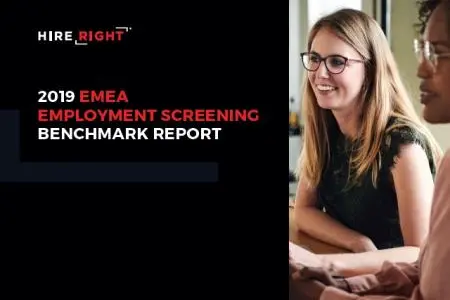PHOTO
UAE, Dubai: HireRight, a leading provider of global employment background checks, has announced the findings from their 2019 EMEA Employment Screening Benchmark Report.
The Report shows that a staggering 83% of surveyed HR professionals discovered candidates who had misrepresented information during the recruitment process.
The most common CV discrepancies found were regarding previous employment history (56%) and education credentials (49%). Worryingly, 37% of respondents also reported candidate criminal record discrepancies. This could explain why the Report found 13% more EMEA companies carrying out criminal record checks this year.
A shift towards adverse media screening
Hiring bias emerged as an area of increasing concern for businesses in the 2019 Report. 39% of HR professionals have known people in their organisation to rely on ‘gut instinct’ to recruit high-profile positions. The notable drop in the number of companies undertaking social media checks (from 26% in 2018 to 14% in 2019) could be indicative of this.
Whilst social media checks appear to be in decline, 18% of EMEA businesses are now carrying out adverse media checks. This is a public record check for adverse mentions of a candidate/employee in online news publications, excluding social media. The Report showed that some industries have already broadly adopted this check as part of their screening programs.
Those working in the Financial Services sector are up to three times more likely to run adverse media checks. 55% are utilising the check on their new hires, with 46% also using it on their current workforce. This suggests protecting their company reputation both pre- and post-hire may be a higher priority in this regulated sector.
Inconsistent screening of the extended workforce
Many businesses may have not yet adjusted their screening practices to reflect the rise in temporary and contract work. As such, they could be leaving themselves open to unnecessary risk. The Report found that only 68% screen temporary or contingent workers, and just 58% of businesses screen independent contractors.
It also saw that for short-term or junior roles, EMEA businesses are far less likely to screen their wider workforce. Only 37% of interns and 16% of volunteers are subject to screening processes.
Peter Cleverton, General Manager, EMEA at HireRight, comments, “The world of work is changing in many ways. In particular, the rise in temporary and contract work in EMEA has provided opportunities for businesses and employees to operate more flexibly. However, as our research shows, many businesses are needlessly opening themselves up to reputational risk by not treating temporary workers with the same level of rigour as their permanent employees.
“Businesses are increasingly aware of how important it is to protect themselves from ineffective or deliberately harmful individuals, particularly those in senior positions. It is interesting to see the growing trend of businesses implementing adverse media checks in light of this growing concern, particularly within the Financial Services sector. It is evident that more businesses are seeing this type of screening as a more effective way to mitigate reputational damage.
“The fact that most HR professionals are continuing to find discrepancies in candidates’ CVs once again highlights the importance of establishing a robust screening system. Employment background screening not only offers HR professionals an opportunity to streamline the recruitment process, but to manage brand reputation from a different side of the business.”
- ENDS -
Survey Methodology
The 2019 EMEA Employment Screening Benchmark Report explores trends and attitudes from Human Resources departments across Europe, the Middle East and Africa. It is based on global research, with over 4,000 HR professionals anonymously sharing their experience and knowledge of their company’s employment screening and recruitment practices with us.
There were 452 participants from the EMEA region, whose responses are detailed in this report.
Additional reports will be available from the HireRight website, covering other vertical and/or geographical breakdowns of the survey results.
About HireRight
HireRight is a leading global provider of background screening services helping organisations mitigate employee risk, and make better informed hiring decisions. We work in more than 200 countries and territories, and have offices across the globe, including the UK, USA, and Hong Kong. Almost half of the Fortune 100 and over a quarter of the FTSE 100 use our services.
For more information about HireRight’s services, visit https://ww.hireright.com/emea/.
For further information, please contact:
Twister Communications ME
Elena Gramatica or Emma Barber
052 692 3606 or 055 872 3009
egramatica@twisterme.ae or ebarber@twisterme.ae
Disclaimer: The contents of this press release was provided from an external third party provider. This website is not responsible for, and does not control, such external content. This content is provided on an “as is” and “as available” basis and has not been edited in any way. Neither this website nor our affiliates guarantee the accuracy of or endorse the views or opinions expressed in this press release.
The press release is provided for informational purposes only. The content does not provide tax, legal or investment advice or opinion regarding the suitability, value or profitability of any particular security, portfolio or investment strategy. Neither this website nor our affiliates shall be liable for any errors or inaccuracies in the content, or for any actions taken by you in reliance thereon. You expressly agree that your use of the information within this article is at your sole risk.
To the fullest extent permitted by applicable law, this website, its parent company, its subsidiaries, its affiliates and the respective shareholders, directors, officers, employees, agents, advertisers, content providers and licensors will not be liable (jointly or severally) to you for any direct, indirect, consequential, special, incidental, punitive or exemplary damages, including without limitation, lost profits, lost savings and lost revenues, whether in negligence, tort, contract or any other theory of liability, even if the parties have been advised of the possibility or could have foreseen any such damages.




















